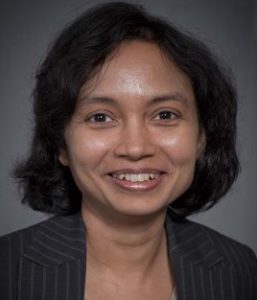 McGowan Institute for Regenerative Medicine affiliated faculty member Ipsita Banerjee, PhD (pictured), Professor in the Department of Chemical and Petroleum Engineering at the University of Pittsburgh, is the co-author of a journal article entitled, “De novo construction of T cell compartment in humanized mice engrafted with iPSC-derived thymus organoids,” which appeared in Nature Methods. Dr. Banerjee’s research interests and collaborations include:
McGowan Institute for Regenerative Medicine affiliated faculty member Ipsita Banerjee, PhD (pictured), Professor in the Department of Chemical and Petroleum Engineering at the University of Pittsburgh, is the co-author of a journal article entitled, “De novo construction of T cell compartment in humanized mice engrafted with iPSC-derived thymus organoids,” which appeared in Nature Methods. Dr. Banerjee’s research interests and collaborations include:
- pluripotent stem cells
- systems modeling of signaling pathways
- biomanufacturing of pluripotent stem cells
- pancreatic islet organoid engineering
- organ engineering
- nanotoxicity evaluation
The abstract of the Nature Methods paper follows:
Hematopoietic humanized (hu) mice are powerful tools for modeling the action of human immune system and are widely used for preclinical studies and drug discovery. However, generating a functional human T cell compartment in hu mice remains challenging, primarily due to the species-related differences between human and mouse thymus. While engrafting human fetal thymic tissues can support robust T cell development in hu mice, tissue scarcity and ethical concerns limit their wide use. Here, we describe the tissue engineering of human thymus organoids from inducible pluripotent stem cells (iPSC-thymus) that can support the de novo generation of a diverse population of functional human T cells. T cells of iPSC-thymus-engrafted hu mice could mediate both cellular and humoral immune responses, including mounting robust proinflammatory responses on T cell receptor engagement, inhibiting allogeneic tumor graft growth and facilitating efficient Ig class switching. Our findings indicate that hu mice engrafted with iPSC-thymus can serve as a new animal model to study human T cell-mediated immunity and accelerate the translation of findings from animal studies into the clinic.
Illustration: University of Pittsburgh Swanson School of Engineering.
Read more…
Abstract (De novo construction of T cell compartment in humanized mice engrafted with iPSC-derived thymus organoids. Ann Zeleniak, Connor Wiegand, Wen Liu, Catherine McCormick, Ravikumar K., Amir Alavi, Haonan Guan, Suzanne Bertera, Robert Lakomy, Asako Tajima, Henry Cohen, Stephanie Wong, Lame Balikani, Benjamin Mizerak, Ziv Bar-Joseph, Massimo Trucco, Ipsita Banerjee & Yong Fan. Nature Methods (2022).)
